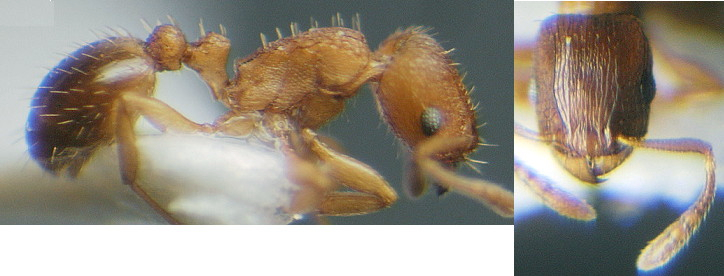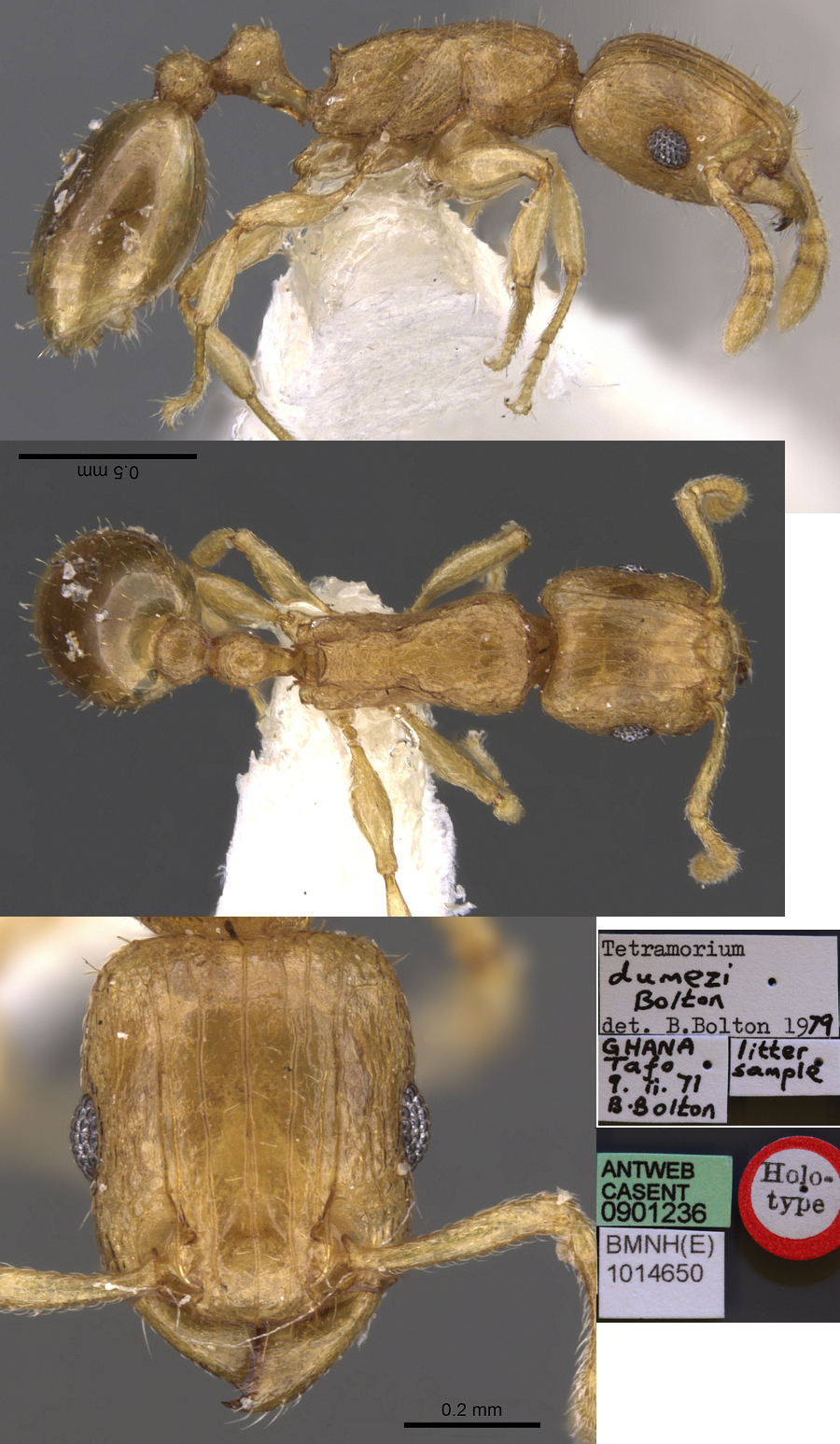Tetramorium dumezi Forel
  Type location Zaïre (Tetramorium
simillimum Sm. r. isipingense For. v. Dumezi n.
var., Forel, 1916: 422; listed as T. simillimum var dumezi
by Menozzi, 1942: 177, worker) - see below. Type location Zaïre (Tetramorium
simillimum Sm. r. isipingense For. v. Dumezi n.
var., Forel, 1916: 422; listed as T. simillimum var dumezi
by Menozzi, 1942: 177, worker) - see below.
Bolton (1995: 407) raised the
variety to species and synonymised the material with that he described
as dumezi n.sp. (Bolton, 1980).
The specimens were referred to
by Bequaert (1922, p 407) as collected in myrmecophilous plants by
Father H Kohl, from the Kisangani area (originally described by Forel,
1916). Bolton did not give this information.  . .
|
Forel's (1916) description is at  . Found in a myrmecophile plant. All that
appears in Menozzi (1942) is - "Tetramorium simillimum var. dumezi
FOR." some workers. Bolton's modern description (1980) is at . Found in a myrmecophile plant. All that
appears in Menozzi (1942) is - "Tetramorium simillimum var. dumezi
FOR." some workers. Bolton's modern description (1980) is at  . .
WORKER - TL 2.7-3.1 mm (Forel has TL 2.1-2.5 mm, smaller
than the type, simillimum, TL 2.0-2.7 mm); smooth mandibles,
entire clypeal margin and no standing hairs on the scapes and tibiae.
All dorsal surfaces with scattered short straight hairs. Colour clear
pale yellow (Bolton, 1980: 346, not illustrated).
Bolton (1980) described his "holotype" and 10 "paratype"
workers, from leaf litter at CRIG, Ghana (9.ii.1971). He also
listed collections in Ghana at Numia, Bunso and Enchi (D. Leston),
Aburi (P.M. Room), and CRIG (C.A. Collingwood and C.A.M. Campbell).
Elsewhere it was known from Nigeria, at IITA
(B.R. Critchley), and Zaïre (Bolton, 1980).
|
If one considers dumezi for which there is no
illustration, a quandry arises. After stating he had examined syntype
workers of Tetramorium simillimum Sm. r. isipingense For. v.
dumezi
n. var. Forel (1916: 422) collected by Father H Kohl at St.
Gabriel Mission, Congo, Bolton (1980: 346) designated further specimens
collected in Ghana by himself, reporting other material from Ghana and
Nigeria. Bolton, who stated he had examined and measured the holotype,
gave measurements of TL 2.7-3.1 mm, SI 70-77; whereas Forel
gave a TL 2.1-2.5 mm, and said the scape almost reached the occiput.
Bolton's Ghana-Nigeria specimens were found in leaf litter; Forel's
were found in a myrmecophile plant. Menozzi (1942: 177) reporting ants
from Fernando Po and Rio Muni had the record - "Tetramorium
simillimum var. dumezi For. Alcune operaie [some workers]".
|
 An
answer to what exactly Forel's dumezi was is to back track the
thought process he had adopted some forty years earlier. In his first
major work on ants, Forel had adopted the curious, if not bizarre,
attitude that the practice of Mayr in naming new species was in some
way wrong and it was preferable to avoid a proliferation of new
"species" by settling rather for giving the name of races to
poorly determined species, or one could call them sub-species (Forel,
1874: III). Quite why the third level of variety came into use is not
clear. An
answer to what exactly Forel's dumezi was is to back track the
thought process he had adopted some forty years earlier. In his first
major work on ants, Forel had adopted the curious, if not bizarre,
attitude that the practice of Mayr in naming new species was in some
way wrong and it was preferable to avoid a proliferation of new
"species" by settling rather for giving the name of races to
poorly determined species, or one could call them sub-species (Forel,
1874: III). Quite why the third level of variety came into use is not
clear.
Forel's dumezi description, therefore, expects
one to comprehend the general form of the base species Tetramorium
simillimum (as the photograph, right). From that one has to
consider Tetramorium
isipingense from the Forel (1914d: 225) notes as bigger, TL
2.9-3.1 mm, than the type; head without shallow scrobes and with
shorter frontal carinae; the propodeum with smaller teeth generally
more elongated and metapleural lobes larger; wholly shiny and with much
less dense rugae and reticulation; colour paler - "this form would
merit species status if T. simillimum was not so variable".
Forel has the rest as the type but does not refer to the sparse, short,
blunt hairs found on simillimum. Both have an SI 78-81.
Forel's (1916) dumezi has TL 2.1-2.5 mm; smaller
than type of the race (isipingense); propodeal teeth slightly
stronger and more distinct; scape shorter, failing to reach the occiput
by about 2.5 times its own width; the semi-scrobe and the frontal
carinae are notably clearer; the petiole node is a little less rounded;
overall slightly more robust; colour darker on the head but lighter on
the gaster.
|
 The
photomontage of the holotype worker is collated
from http://www.antweb.org/specimen.do?name=casent0901120 The
photomontage of the holotype worker is collated
from http://www.antweb.org/specimen.do?name=casent0901120
|
Oxford University Museum
specimens
Tetramorium dumezi
B Taylor det.
|
Cameroun
A Fotso Kuate
Tetramorium spE
|
19.xi.2007
Awae IV
03°54'30" N
11°25'58"
|
Quadrat in fallow
|
2
|
 |
|
 The
photomontage is
of a worker from Cameroun;
Awae II; collector A Fotso Kuate (fk
tetramorium sp E). The
photomontage is
of a worker from Cameroun;
Awae II; collector A Fotso Kuate (fk
tetramorium sp E).
The size and CI 72 are close to the Bolton measurements.
|
|